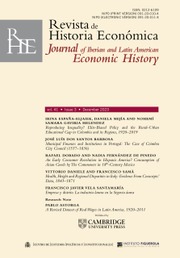Article contents
Los mercaderes de México y la transgresión de los límites al comercio pacífico en Nueva España, 1550–1620*
Published online by Cambridge University Press: 28 April 2010
Abstract
The constant state of war which dominated the reign of Philip II and part of Philip III'S exerted a growing fiscal demand both on Castile and the American Colonies. The American treasure which opened the doors to credit to finance these campaigns increased substantially over the 17th century. Never the less, the merchants, which controlled the extraction of precious metals and their shipments to the metropolis, established a highly lucrative trade with the Peru and the Philippines which created a constant drain of silver to the Far East. Based on the complaints filed by the Consulado de Sevilla about the competition of Chinese goods and the loss of American silver, the Monarch imposed heavy restrictions on the triangular trade in the Pacific. These restrictions created conflicts with the American viceroys who were interested in this trade and resulted in the generalization of smuggling.
Resumen
El estado de guerra permanente durante el reinado de Felipe II y parte del de Felipe III dio lugar a una demanda fiscal creciente en Castilla e Indias. El tesoro americano, que aseguraba a la Monarquía Católica el acceso al crédito con que sostener sus campañas, aumentó mucho a lo largo del siglo XVI. No obstante, los mercaderes de la ciudad de México, que aseguraban la producción de metales preciosos y su envío a la metrópoli, establecieron un tráfico altamente rentable con Perú y Filipinas, el cual presentaba el gran inconveniente de generar un flujo continuo de plata hacia el Lejano Oriente. Ante las quejas del Consulado de Sevilla por la competencia de los géneros chinos y la pérdida de plata americana, el Monarca impuso restricciones al comercio triangular del Pacífico, las cuales lo enfrentaron con las autoridades de los virreinatos indianos interesados en dicho tráfico, con el resultado de una generalización del contrabando.
Keywords
JEL classification
- Type
- El Imperio
- Information
- Copyright
- Copyright © Instituto Figuerola de Historia y Ciencias Sociales, Universidad Carlos III de Madrid 2005
References
BIBLIOGRAFÍA
- 8
- Cited by


